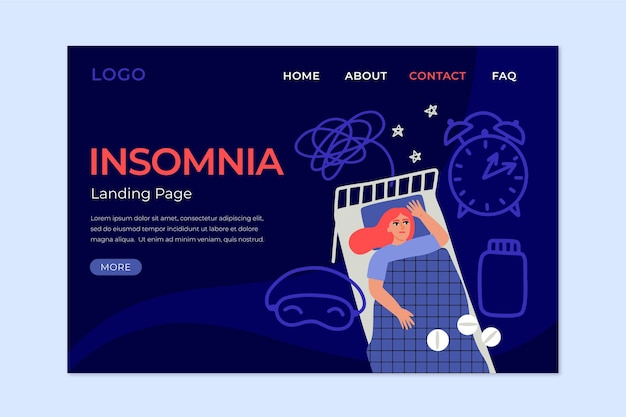
A recent survey by the National Sleep Foundation found that over 76% of parents deal with sleep deprivation. This issue isn’t limited to parents, though. Military personnel, students pulling all-nighters, and people who work night shifts often suffer from a lack of sleep. Whether due to insomnia, a new baby, or other reasons, sleep deprivation is a common struggle. To tackle this problem, it’s important to understand its root causes.
### Understanding Sleep Deprivation
Sleep isn’t just one continuous state; it consists of two main types of sleep patterns: REM and Non-REM. REM stands for Rapid Eye Movement, which is when dreams occur. Non-REM sleep has four stages: feeling drowsy, falling asleep, and two stages of deep sleep where the body restores itself.
Transitioning through these four stages takes about 90 minutes, after which the body enters REM sleep. This cycle repeats 4-6 times per night. Most restorative sleep happens in the first part of the night, while dream sleep happens in the early morning.
Sleep is as vital as food and water. Chronic sleep deprivation can harm performance, health, and even lifespan. During sleep, the body produces hormones that regulate numerous functions, and it consolidates new information learned throughout the day.
The sleep-wake cycle is part of our circadian rhythm, influenced by light exposure and controlled by an internal clock in the brain. This cycle impacts our alertness and energy levels at different times of the day. The amount of sleep needed varies among individuals, but most people need 7 to 9 hours of sleep each night. Illness, health issues, and depression can increase this need.
If the sleep cycle is disrupted, a person may wake up feeling tired. The stage of sleep at which a person is awakened affects their alertness. Disturbances in sleep cycles lead to sleep deprivation, often exacerbated by work demands, lifestyle choices, or family responsibilities. Chronic sleep deprivation is a common problem for shift workers and those with sleep disorders like insomnia, sleep apnea, or narcolepsy.
### The Effects of Sleep Deprivation
In modern society, sleep is often viewed as a luxury rather than a necessity. Reducing sleep time even by an hour can have serious health implications. Lack of sleep leads to fatigue, impaired thinking, and slower reaction times. Staying awake for 18 hours results in an impairment similar to a 0.05% blood alcohol level, which doubles after 24 hours without sleep. A drowsy driver can be as dangerous as a drunk driver.
Here are signs you might not be getting enough sleep:
– Needing an alarm clock to wake up.
– Trouble getting out of bed in the morning.
– Feeling stressed, irritable, or tired during the week.
– Difficulty concentrating and remembering things.
– Falling asleep in warm rooms or during meetings.
– Needing naps during the day.
– Feeling drowsy while driving.
– Falling asleep quickly at bedtime.
### Coping with Sleep Deprivation
Getting quality sleep is crucial for overcoming sleep deprivation. Here are some tips to help:
1. **Avoid Stimulants and Excessive Activity at Night**: Stay away from TV, tobacco, caffeine, and alcohol before bed. Over-the-counter sleeping pills are not recommended. Reduce stress through relaxation techniques.
2. **Exercise Regularly**: Exercising during the day can improve sleep quality. However, avoid exercising within four hours of bedtime.
3. **Take Naps**: Short naps (about 20 minutes) can be helpful. For shift workers, longer naps (up to two hours) are beneficial.
4. **Consider Melatonin Supplements**: Melatonin can help regulate sleep. Although not FDA-approved, some find it beneficial.
5. **Consult a Doctor**: If sleep problems persist, consult a healthcare provider. They may prescribe medications or address underlying medical conditions.
6. **Make Up for Lost Sleep**: Extra sleep during weekends can help, but avoid long sleep binges.
7. **Avoid Heavy Meals Before Bed**: Eating heavy meals or engaging in stressful activities before bed can disrupt sleep. A warm glass of milk can help.
8. **Create a Sleep-Friendly Environment**: Keep the bedroom dark, cool, and quiet. Use light-blocking curtains and white noise if needed.
9. **Establish a Bedtime Routine**: Develop relaxing pre-sleep habits like reading or taking a bath. Keep a consistent sleep schedule.
10. **Communicate Your Sleep Needs**: Let your employer, spouse, or family members know about your sleep requirements.
11. **Delegate Responsibilities**: Lighten your workload if necessary to reduce stress and get more sleep.
12. **Seek Help**: If you need assistance, whether from a healthcare provider or family, don’t hesitate to ask.
13. **Check for Sleep Disorders**: Conditions like sleep apnea can affect sleep quality. A sleep study can help diagnose these issues.
14. **Complete Tasks to Reduce Stress**: Unfinished work can cause anxiety and affect sleep. Prioritize tasks and seek help if needed.
15. **Maintain a Healthy Diet**: Nutrient-rich foods can promote better sleep.
16. **Don’t Obsess Over Eight Hours**: Focus on how you feel during the day rather than on a specific number of sleep hours.
17. **Don’t Force Sleep**: Engage in relaxing activities if you struggle to fall asleep.
18. **Maintain a Routine**: A consistent routine helps regulate sleep.
19. **Eliminate Worries**: Address concerns during the day rather than at bedtime.
20. **Keep a Sleep Journal**: Tracking sleep patterns can help identify issues and improve sleep habits.
21. **Evaluate Your Schedule**: Long work hours can affect sleep. Adjust your schedule if possible.
22. **Seek Therapy or Medication**: If needed, professional therapy or medication can help treat insomnia.
### Conclusion
Sleep is essential for your physical and mental well-being. Don’t underestimate the importance of a good night’s sleep. Prioritize sleep to maintain your health and improve your overall quality of life.